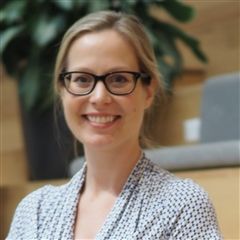Alexia Kedves Volpe '01
Biomedical Researcher
Alexia Kedves Volpeis doing now exactly what she hoped she would be doing nearly 20 years ago, when she was a junior in the Biotechnology and Ethics course taught by Sr. Mary Jane Paolella, ASCJ, ’65. "That was the first time I was aware of what research was about," she says, "and I knew then that I wanted to do that kind of hands-on science."
Alexia went on to major in cell and molecular biology at Worcester Polytechnic Institute. After graduation, she worked for three years in neuroscience research at Yale—focusing on learning and memory in the context of drug addiction—then earned a master's degree at Quinnipiac University in cell and molecular biology.

Since 2009, she has been an investigator at Novartis Institute for Biomedical Research in Cambridge, Massachusetts. In her first years at Novartis, she was part of a team working to understand the essential cellularmechanisms of TP53, the most commonly mutated gene in several kinds of cancer—"really early stage cell biology," she says.
For the past three years, Alexia has been working closely with Novartis' chemists on a project that focuses on epigenetics—the study of changes in organisms that are caused by modification of gene expression (turning genes on or off) rather than alteration of the genetic code itself. She explains, "We are working on an epigenetic target that changes the chromatin state— the accessibility of your DNA to have genes turn on and off. That state can change depending on whether a cell is a normal cell or a cancer cell. The ultimate goal is to create an agent that could be given with standard chemotherapy to make the therapy more effective, to target it more precisely, or to be able to reduce the dosage, since chemo can be toxic." The result, she says, could be longer, or at least healthier lives for a number of patients.
What is fascinating from a research perspective, Alexia notes, is how different each cancer is, and how differently even the same disease affects each person because everything can affect one's DNA—age, gender, environmental factors. What is frustrating is that that complexity means that the goal for any project, including her current one, may be a distance away, or may not be met at all.
Still, the successes are exhilarating. "So many research projects do not yield the desired results," she says. "I have been here for ten years and none of the compounds I've worked on have been given to a person. But I hope that what I am working on now will. What keeps us going is the knowledge that any project we are working on could change or save someone's life."


